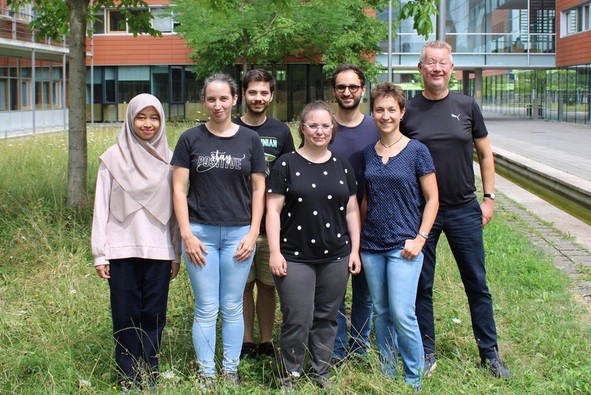Plant Metabolism - Prof. Dr. Peter Geigenberger
The central theme of my research is to investigate how plant metabolism is regulated and coordinated in response to environmental signals and how this affects growth, development and out-put traits in plants. To achieve this, we use a combination of systems biology and hypothesis driven approaches focussing on an integrated analysis (-omics profiling) of plant metabolism in different genotypes and environments. This includes genetic, biochemical and molecular-physiological methods. A further aim is to assess biotechnological applications to improve crops. In the context of the SFB-TR 175 B02, we explore the role of dynamic adjustments in photosynthetic metabolism of plants to acclimate to fluctuating light intensities and low temperatures. In the context of the DFG project Ge 878/7-2, we explore signalling components that are involved in the homeostatic response of plants to low oxygen concentrations.
(i) When grown in the field plant photosynthesis has to manage strong fluctuations in light intensities. We found that thioredoxins play a crucial role to ensure light-responsive control of photosynthetic reactions in the chloroplast to optimize photosynthesis and maintain growth in fluctuating light regimes. Work is in progress to dissect the underlying mechanisms using Arabidopsis plants.
(ii) Also low temperature is an important factor for plant performance. A decrease to sub-freezing temperatures leads to ice-formation and dehydration resulting in severe cellular damage. Acclimation of plants to low temperatures has been found to increase the freezing tolerance of cold-hardy plants, which is accompanied by a stimulation of photosynthesis and accumulation of soluble sugars. In this context starch metabolism provides an alternative route for the accumulation of soluble sugars in the chloroplast stroma during cold acclimation. Work is in progress to investigate the role of the regulation of starch metabolism for cold acclimation and frost tolerance in Arabidopsis plants.
(iii) Plants experience low oxygen concentrations in specific tissues during their development and in response to decreased oxygen availability in their environment due to waterlogging and flooding. Under these conditions, oxygen deprivation leads to the induction of a specific set of genes to promote hypoxic acclimation. Subgroup-VII-ethylene-response-factor (ERF-VII) transcription factors are involved in the regulation of hypoxic gene expression and regulated by proteasome-mediated proteolysis via the oxygen-dependent branch of the N-end-rule pathway. By comparing Arabidopsis plants overexpressing N-end-rule sensitive and insensitive forms of the ERF-VII-factor RAP2.12, we provide evidence that oxygen-dependent RAP2.12 stability regulates central metabolic processes to sustain growth, development and anoxic resistance of plants. Work is in progress to dissect the underlying mechanisms and the role of sucrose-non-fermenting-1 related kinase (SnRK1) in these responses.

Head
Address
Biozentrum der LMU München
Großhadernerstr. 2-4
D-82152 Planegg-Martinsried
Germany


